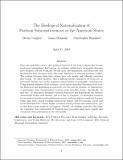| dc.contributor.author | Caughey, Devin | |
| dc.contributor.author | Dunham, James | |
| dc.contributor.author | Warshaw, Christopher | |
| dc.date.accessioned | 2021-09-20T17:17:18Z | |
| dc.date.available | 2021-09-20T17:17:18Z | |
| dc.date.issued | 2018-04-23 | |
| dc.identifier.uri | https://hdl.handle.net/1721.1/131492 | |
| dc.description.abstract | Abstract
Since the mid-twentieth century, elite political behavior in the United States has become much more nationalized. In Congress, for example, within-party geographic cleavages have declined, roll-call voting has become more one-dimensional, and Democrats and Republicans have diverged along this main dimension of national partisan conflict. The existing literature finds that citizens have only weakly and belatedly mimicked elite trends. We show, however, that a different picture emerges if we focus not on individual citizens, but on the aggregate characteristics of geographic constituencies. Using biennial estimates of the economic, racial, and social policy liberalism of the average Democrat and Republican in each state over the past six decades, we demonstrate a surprisingly close correspondence between mass and elite trends. Specifically, we find that: (1) ideological divergence between Democrats and Republicans has widened dramatically within each domain, just as it has in Congress; (2) ideological variation across senators’ partisan subconstituencies is now explained almost completely by party rather than state, closely tracking trends in the Senate; and (3) economic, racial, and social liberalism have become highly correlated across partisan subconstituencies, just as they have across members of Congress. Overall, our findings contradict the reigning consensus that polarization in Congress has proceeded much more rapidly and extensively than polarization in the mass public. | en_US |
| dc.publisher | Springer US | en_US |
| dc.relation.isversionof | https://doi.org/10.1007/s11127-018-0543-3 | en_US |
| dc.rights | Creative Commons Attribution-Noncommercial-Share Alike | en_US |
| dc.rights.uri | http://creativecommons.org/licenses/by-nc-sa/4.0/ | en_US |
| dc.source | Springer US | en_US |
| dc.title | The ideological nationalization of partisan subconstituencies in the American States | en_US |
| dc.type | Article | en_US |
| dc.contributor.department | Massachusetts Institute of Technology. Department of Political Science | |
| dc.eprint.version | Author's final manuscript | en_US |
| dc.type.uri | http://purl.org/eprint/type/JournalArticle | en_US |
| eprint.status | http://purl.org/eprint/status/PeerReviewed | en_US |
| dc.date.updated | 2020-09-24T21:26:12Z | |
| dc.language.rfc3066 | en | |
| dc.rights.holder | Springer Science+Business Media, LLC, part of Springer Nature | |
| dspace.embargo.terms | Y | |
| dspace.date.submission | 2020-09-24T21:26:12Z | |
| mit.license | OPEN_ACCESS_POLICY | |
| mit.metadata.status | Authority Work and Publication Information Needed | |
